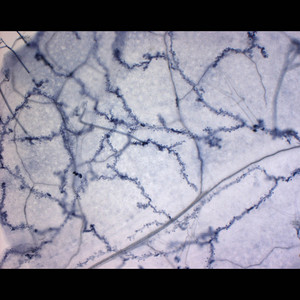Dec. 19, 2008 Research Highlight Biology
Plant immunity: PUBs are bad for the health
Genes known as pubs have a negative effect on a plant’s immune system
 Figure 1: An Arabidopsis leaf infected with water mold, or oomycetes, (seen as Y-shaped filaments). Plants lacking the pub genes have stronger immune systems than normal plants, which can hinder the growth of pathogens such as oomycetes. Copyright © 2008 Ken Shirasu
Figure 1: An Arabidopsis leaf infected with water mold, or oomycetes, (seen as Y-shaped filaments). Plants lacking the pub genes have stronger immune systems than normal plants, which can hinder the growth of pathogens such as oomycetes. Copyright © 2008 Ken Shirasu
Disease-causing pathogens carry unique molecular motifs that can be recognized by plants. The motifs, known as pathogen-associated molecular patterns or PAMPs, trigger several reactions in the plant which together generate a defensive immune response.
Ken Shirasu and co-workers at the RIKEN Plant Science Center, Yokohama, and the John Innes Centre, Norwich, UK, have discovered a triplet of genes that appear to hinder the PAMP immune response in Arabidopsis plants1. The genes, called pub22, pub23 and pub24, code for enzymes called ubiquitin ligases (PUBs), which help to mark other proteins by attaching them to the universal protein ubiquitin.
The researchers decided to study the pub genes because they are similar to a gene known to promote disease resistance in tobacco. To their surprise, they found that when the three genes were deactivated in a mutant strain of Arabidopsis, the plant’s immune response improved. This means that the genes have a negative effect on immunity.
One of the first immune responses triggered by exposure to PAMPs is the oxidative burst, a rapid production of reactive oxygen compounds. In the mutant Arabidopsis plants, the oxidative burst was much stronger, and lasted longer than in wild-type plants. The mutants also showed prolonged activity of signaling molecules and genes known to improve the immune response, and more controlled cell death at infected sites.
These immune system enhancements are not specific to one type of pathogen—they occurred in response to several PAMP stimuli taken from bacterial flagella, the cell walls of fungi, and bacterial DNA transcription proteins. Even more impressively, the absence of pub genes hinders the pathogens themselves. Bacteria and moulds attacking the mutant plants showed up to 30 times less growth than on wild-type plants (Fig. 1).
It is likely that the PUB enzymes break down or block the activity of other molecules that promote immunity, by binding the molecules to ubiquitin. A similar phenomenon has been observed in mammals, where ubiquitination has a detrimental effect on protein signaling.
In the future, the researchers hope to identify the exact molecules that are targeted by the PUB triplet. This could help to solve the biggest mystery—why plants have retained genes that make them more vulnerable to disease.
“Plants face pathogens every day and need appropriate levels of immune responses, so they don’t waste energy,” explains Shirasu. “Our knowledge of these regulatory genes could improve disease resistance in agriculture, especially when crops are transferred long distances to areas where they encounter completely new pathogens."
References
- 1. Trujillo, M., Ichimura, K., Casais, C. & Shirasu, K. Negative regulation of PAMP-triggered immunity by an E3 ubiquitin ligase triplet in Arabidopsis. Current Biology 18, 1396–1401 (2008). doi: 10.1016/j.cub.2008.07.085
